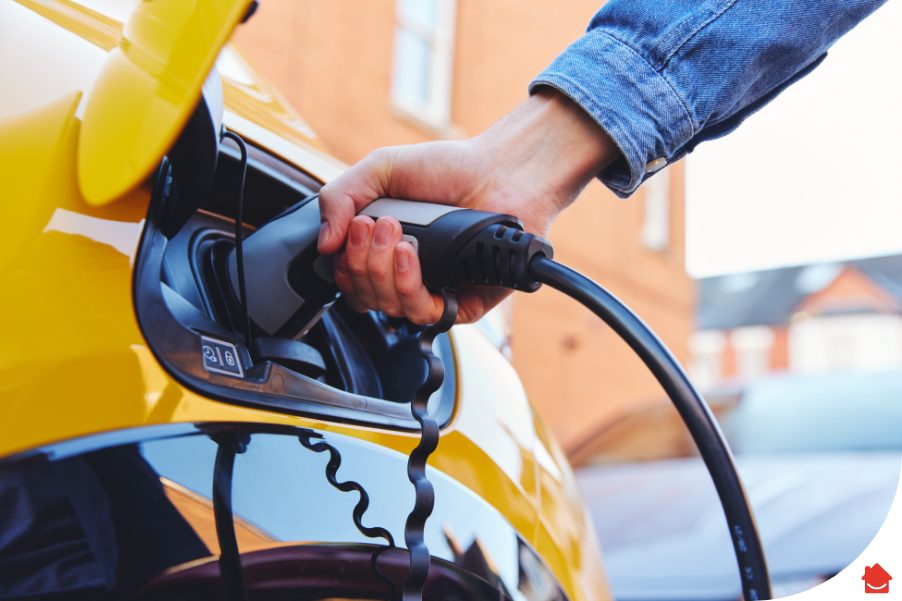Energy saving advice
Electric Car Charging at Home: Complete Guide
31 May 2022 • 5 minutes


Electric vehicles (EVs) are becoming ever more popular when it’s time to change your car – and from 2030 if you want a new motor, you’ll have to go electric. Electric charging hubs are popping up everywhere, but for convenience (and the lowest cost) your best bet is to have an EV charger at home.
So how does it work?
The easiest and safest way to charge your car is to park it off-road – either in your garage or your driveway. It is possible to charge your car when it’s parked on the road, but we’d suggest you check with your council first, as running your charging cable across the pavement could be a safety issue for pedestrians. You’ll also need to make sure your cable will be long enough to comfortably reach your car.
Next, decide the best place to install your charging point. Again, keep safety in mind – if your charger is attached to the back wall of your house and you need to run the charging cable around the side to the front, there’s more chance someone will trip over it!
It’s all about power and speed of charge when you’re looking at different wall chargers. Most of them will offer a charging power of up to 7.4kW. You can get more power than this but you’ll usually find them at commercial charge points, where the power input is greater than your home can provide.
You can also choose a lower power rate, but bear in mind it will take considerably longer to fully charge your car.
The only difference between a tethered and untethered charging unit is that one has a charging lead attached and the other doesn’t. If you’re going to use other EV points to charge your car, you might find it easier to use the detachable cable that comes with your car. An untethered charging point will also allow you to use either a type 1 or type 2 charger (most new cars use type 2 connectors – but worth checking which type your car uses to make sure to choose the right one for you).
In most cases, it will just come down to convenience: would you rather have the cable already attached to the charger and ready to go, or are you happy to use the car’s cable?
The “smart” part of a smart charger is that you can use an app to monitor how your car is charging and also set a timer for when you want the charger to switch on. This would definitely come in handy if your electricity is cheaper at night: you could plug your car in when you get home from work, but set it to come on in the middle of the night.
It’s also worth noting that from 1st July 2022 non-smart charges are banned in the UK. This means all charge points will need to have data connectivity, making them smart to varying degrees. You can learn more about this subject on the Lease Plan website.
Some cars can charge up to 22kW, but whether you can achieve this is or not depends on your electricity supply. The large majority of the UK is on a three-phase (three live wires) supply, but unfortunately, most homes are only actually attached to one live wire, which isn’t strong enough to charge to 22kW.
While you can charge your car using a normal 2.4kW three-pin socket, it’s strongly discouraged as a permanent set-up: three-pin outports need to be a higher standard than your traditional sockets to perform the task safely, not to mention you could be waiting more than 36 hours before your car is fully charged!
In general, chargers will cost between £450 and £1,200 to buy and install.
It’s worth keeping in mind that if you park your car on the road, or need to install your charger further away from your driveway, you may need a longer cable which will cost more than a standard size. Installation might also cost more if your existing electrics need modification or you wish to position the charge further away from your home’s fuse box.
Don’t try and do it yourself! Charging points must be installed by a certified installer. A quote from a certified provider will include the installation cost and fitting the charger itself will generally take about three hours to complete.
Read our article to learn more about how to prepare your home for EV chargers.
Yes you can, but it isn’t advised as a permanent solution to your charging needs – this is because your standard 3-pin plug isn’t designed to facilitate such high levels of power over time and it could take you much longer than a purposely designed charging point.
Yes, it is possible to use a 13 amp socket, but it will be much slower than if you use an EV charging point. It’s generally unadvised you to use a normal plug socket, but it is possible as a temporary measure if there are no other charging points available.
You don’t need planning permission to install your charger, but the tradesperson installing your charger will need to inform the district electric network supply company. This doesn’t stop charger installation at the moment but could do so in the future if regulations change.
Your charging point will run off your mains electricity supply and is usually either 3.6kW or 7kW. Some cars can charge up to 11kW, but these need to be using a 3-phase connector via your electricity supply and most homes only use a 1-phase connector. If you aren’t sure which connector you have or want to use an 11kW charger, please contact your electricity provider for help.
Our help & advice articles cover Plumbing, Home heating, Electrical, Energy-saving and Home maintenance.